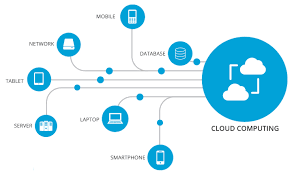
Navigating the Cloud: Exploring Cloud Computing and Hybrid Cloud Solutions
Understanding Cloud Computing
At its core, cloud computing refers to the delivery of computing services—including storage, processing power, and software—over the internet, rather than relying on local servers or personal devices. Cloud computing offers several key advantages, including:
Scalability: Cloud resources can be rapidly scaled up or down to meet fluctuating demand, allowing organizations to optimize resource utilization and control costs.
Flexibility: Cloud computing provides on-demand access to a wide range of services and applications, enabling businesses to adapt quickly to changing requirements and market conditions.
Cost Efficiency: By leveraging cloud services, organizations can reduce capital expenses associated with hardware procurement and maintenance, shifting to a pay-as-you-go model based on usage.
Reliability and Resilience: Cloud providers offer robust infrastructure and redundancy measures, minimizing the risk of downtime and ensuring high availability for critical applications and data.
Introducing Hybrid Cloud Solutions
While the public cloud offers numerous benefits, some organizations may have specific requirements that cannot be fully addressed by a single cloud deployment model. This is where hybrid cloud solutions come into play. A hybrid cloud environment combines the flexibility and scalability of the public cloud with the control and customization of private infrastructure, allowing organizations to seamlessly integrate on-premises resources with cloud services.
Key Benefits of Hybrid Cloud Solutions
Data Sovereignty: Hybrid cloud solutions enable organizations to maintain sensitive data and critical workloads on-premises or in private cloud environments, ensuring compliance with data residency regulations and security policies.
Optimized Workloads: Hybrid cloud architectures allow organizations to allocate workloads strategically based on performance, security, and cost considerations. Mission-critical applications can run on dedicated infrastructure, while less sensitive workloads can leverage the scalability of the public cloud.
Disaster Recovery and Business Continuity: Hybrid cloud solutions offer robust disaster recovery capabilities, with the ability to replicate data and applications across multiple environments for redundancy and resilience.
Innovation and Agility: By leveraging hybrid cloud solutions, organizations can innovate rapidly, leveraging cloud-native technologies and services while maintaining control over sensitive data and legacy systems.
Navigating the Hybrid Cloud Journey
Transitioning to a hybrid cloud environment requires careful planning and execution to ensure a seamless integration of on-premises infrastructure with public cloud services. Key considerations include:
Assessment and Planning: Conduct a thorough assessment of existing IT infrastructure, workloads, and business requirements to determine the optimal hybrid cloud strategy.
Integration and Connectivity: Establish robust connectivity between on-premises data centers and public cloud providers, leveraging technologies such as virtual private networks (VPNs) or dedicated network links.
Security and Compliance: Implement comprehensive security measures and compliance controls to protect data across hybrid cloud environments, including encryption, access controls, and monitoring.
Monitoring and Optimization: Continuously monitor performance, availability, and costs across hybrid cloud environments, optimizing resource utilization and adjusting configurations as needed.
Embracing the Future of IT
As organizations continue to embrace digital transformation, cloud computing and hybrid cloud solutions will play an increasingly integral role in driving innovation, agility, and efficiency. By leveraging the scalability of the public cloud and the control of private infrastructure, organizations can unlock new opportunities for growth, resilience, and competitive advantage in an ever-evolving business landscape. As we navigate the cloud journey together, let's embrace the opportunities that hybrid cloud solutions offer to shape the future of IT and propel our organizations forward into a new era of digital excellence.